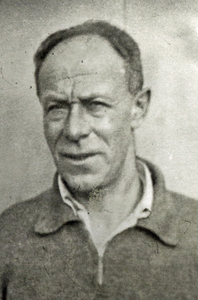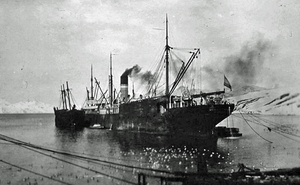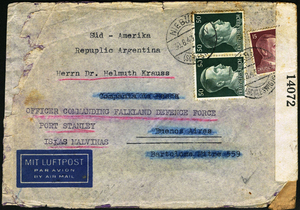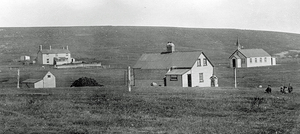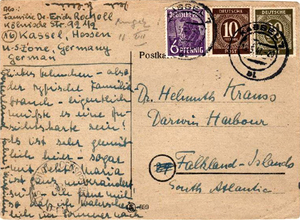KRAUSS, HELMUTH BERHARD OTTO
from Germany
doctor at Grytviken and in the Falklands, was born 28 January 1896 in Halle, Germany to Alfred Krauss and Margarete Krauss née Aschenheim. He attended Freiburg University, and he graduated as an medical doctor on 1 October 1923. He subsequently qualified in 1938 as a psychiatrist. His wife, Maria, lived in Marienhof during WW II.
Krauss was ethnically Jewish, and he was forced to become a refugee, leaving Germany for Norway in 1939. He was employed as a physician by the Compañia Argentina de Pesca for their whaling station at Grytviken, South Georgia from 25 November 1939. It is likely that he arrived at Grytviken in the Compañia Argentina de Pesca’s transport ship Ernesto Tornquist which arrived at Grytviken from Norway via Curaçao, Dutch West Indies. The vessel would have called at Curaçao to take on a cargo of fuel oil as by this time the whaling station at Grytviken and the whale catchers were oil fired. Krauss’ term of employment with Compañia Argentina de Pesca’ would have commenced on the date the vessel sailed from Norway (probably Sandefjord).
Krauss was made subject of a local internment order on 16 April 1941. He was later removed from the internment list in February 1943. His German nationality caused some difficulties for the whaling company, particularly because of the possibility that he might not support the Allied cause. This cause for concern proved to be unfounded.
Krauss was not the only member of his family to suffer under Nazism. In April 1941 his brother, Reinhard Krauss, (born 26 March 1900), was interned on the Isle of Man. He had previously spent one and a half years in a dungeon and another one and half years in a concentration camp in Germany before escaping to Norway in April 1939. After the German invasion of Norway, Reinhard fled to England in a small fishing boat, and he was interned. He was released in June 1943 and was living with Ernst Rachwalsky, at 59 Gunnersbury Avenue, Ealing, London. By 16 February 1944 Reinhard was living at 22 Lyndhurst Gardens, London and appeared to also be a doctor.
On 16 April 1941 an order to detain Helmuth Krauss under the command and control of the Magistrate at South Georgia was issued under the Falkland Islands Defence Regulations. He appealed against the detention on the grounds that although he was of German birth he was prohibited from re-entry to Germany (n.b. his German passport was stamped with a ‘J’) and that he wished to renew his contract with Compañia Argentina de Pesca and return to South Georgia.
In October 1941 the Officer Commanding Troops on South Georgia reported to the Colonial Secretary that:
Dr Krauss was allowed full freedom of movement and went on board any ship that required his services. He was the only medical officer on South Georgia at the time, and he was widely respected and liked.
Whaling was a hazardous profession and during his time as the medical officer at Grytviken Krauss signed death certificates for at least five people – one of whom was the magistrate William BARLAS who was killed by a snow slide which pushed him into the sea while he was walking along the track between King Edward Point and Grytviken. In his first season (1939/40) Krauss had some 260 men (13 of whom were Falkland Islanders) in his care at Grytviken and in 1940 forty-four men are recorded as overwintering.
In a letter dated 7 November 1942 written by Captain Søren FAGERLI (whaling manager at Grytviken 1938-1948) stated that:
During the period 25 November 1939 to 7 November 1942 that Dr Krauss had worked for Compañia Argentina de Pesca he ‘has carried out his work to our entire satisfaction and that our co-operation had been very pleasant. We are therefore sure that it will be difficult to find a physician who is more qualified here, not only for his personal character but also for his capacity as physician, his pronounced conscientiousness and care for his patients. Dr Krauss has therefore gained the trust and sympathy, not only of our company, but also of our men, and we deeply regret that he is now leaving us.’
Krauss sailed from South Georgia to the Falklands on 14 February 1943 and on18 February 1943 he was detained under the command and control of the Officer Commanding Falkland Islands Defence Force. Initially he was interned onboard the FIC hulk Fennia, which was used as a floating warehouse for wool and coal. He was later paroled and accommodated in Stanley at the home of Mr O’Sullivan for £2-5-0 a week. He was required not to leave the house during the time that any overseas ship was in the harbour.
In January 1944 the West Yorkshire Regiment was withdrawn from the Falklands, and among those that left the Falklands was Captain J Skeene RAMC who had acted as the medical officer at Darwin.
In July 1944 Krauss was offered a temporary appointment as medical officer at Darwin on an annual salary of £600 plus quarters. He began work on 28 July 1944. He was to spend nearly three years at Darwin as the medical officer, and once again, he became well regarded as an excellent doctor who had gained the confidence of the community. Krauss continued to act as the medical officer at Darwin until he left for Montevideo in July 1947.
On 12 May 1945 the internment orders were cancelled, and Krauss was informed that he was free and that, if he wished, he could continue in the temporary employment of the Falkland Islands Government.
On 28 May 1946 the Senior Medical Officer in Stanley recommended finding a replacement for Krauss as he was suffering from a form of ‘psycho neurosis’ which was a physical handicap, and it was likely to progress if he stayed and the possibility of a sudden and complete breakdown should be considered.
In September 1946 Krauss’s wife Maria was in the British Zone in Germany and had become unwell. He requested permission to send food parcels to her. This request was denied as it was contrary to the current regulations. While Krauss was at Darwin he received a postcard (see image 1969) from a number of his friends and relatives:
It's very cosy here - we even have champagne. Maria is surely quite unchanged.... We are so happy to have Maria here ... Dearest, for the first time in years upholding the firm belief to be able to see you again next year, yours tenderly, Maria
Krauss was treated at the British Hospital in Montevideo for problems with his back. He then intended to travel to the UK en route for Germany. The Falkland Islands Government guaranteed the cost of his passage to the UK, his hotel expenses in Montevideo and his hospital treatment. He was granted ex gratia three months leave from the date of his departure from the Falkland Islands on his rate of pay of £600 per annum. He had been offered a post as resident neurologist in the municipal hospital in Hamburg.
On 10 July 1947 Krauss wrote to the Falkland Islands Government advising that when he arrived in Stanley, he had surrendered his passport which bore the name ‘Helmuth Bernhard Otto Isreal Krauss’. The name ‘Isreal’ was added by order of the Nazi Government, and he wanted to make sure that it did not appear on any of his papers. To prove his claim, he presented his birth and baptismal certificates. His statement of service advised that:
He has given us efficient and loyal service and he had enjoyed the confidence of his patients even while hostilities continued.
Krauss finally departed the Falklands on 22 July 1947 onboard the SS Fitzroy bound for Montevideo. As a German subject he was issued with an emergency certificate and was recorded as being 5’ 10” tall with blue eyes and grey hair.
Krauss’ problems were far from being over. On 29 July 1947 he wrote to the Colonial Secretary from the Hotel Florida, Montevideo stating that the £20 in English currency he had been given and the £10 credit he had received in Montevideo was insufficient for his needs as he had not had a new suit in eight years. In the three days that he had been in Montevideo the only money he had spent was on a pad of writing paper and the bus to the British Hospital and that the British Consulate did not know how long he would be in Montevideo.
On 13 August 1947 the Colonial Secretary sent a telegram to the British Consul in Montevideo authorising an advance in Uruguayan currency sufficient to buy basic clothing, including one suit, but no further sums could be authorised.
The Crown Agents in London sent a telegram on 18 September 1947 stating that Krauss requested payment of the approximately £1,700 in his Government Savings Bank account. The Colonial Secretary authorised the payment of £1,600 and advised that the balance would be remitted once the details of his advances in Montevideo had been received.
On 12 November 1947 the Crown Agents were instructed to pay Krauss the sum of £120-18-2, being the balance to liquidate his saving bank account. The cost of the telegram - nine shillings and seven pence - was deducted from the amount paid to Krauss.
In November 1947 Dr Krauss was living at 70 Belsize Park Gardens, London NW3.
By 21 December 1947 Krauss had returned to Germany, sailing from Liverpool bound for Flensburg.
Despite his personal circumstances Dr Helmuth Krauss was a fine doctor who was widely respected in the communities he served. He had a difficult life, not the least was persecution in his homeland as the direct result of being Jewish.
Comments
Revisions
April 2023 Biograpghy first added to Dictionary
June 2023 One additional link added
